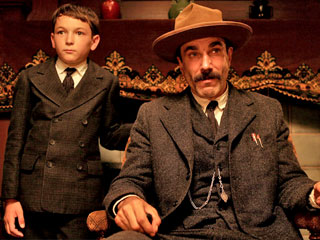The Days of Wine and Oil: There Will Be Blood
by M. Faust

There is no dialogue for the first 15 minutes of There Will Be Blood. Mostly, there is one man in a hole, and he’s not the type to talk to himself. His name is Daniel Plainview (Daniel Day-Lewis), and in this year of 1898 he is digging for silver. The attempt nearly kills him, but eventually he has some success—not in silver, but in oil.
For a while, about a century ago, there was a lot of oil in California. Up to the time of the Depression, California wells were pumping up to 70 percent of the world’s oil supply. Huge fortunes were made, and Plainview is determined that he too will become a very rich man.
Beginning with its biblically portentous title, There Will Be Blood is a film that never does quite what you expect it to. It’s certainly nothing you would expect from writer-director Paul Thomas Anderson, who made Boogie Nights and Magnolia. But whatever else you think of it, it belongs with a fine brace of recent movies that includes No Country for Old Men, Before the Devil Knows You’re Dead, The Assassination of Jesse James, I’m Not There and Darjeeling Limited: audacious films of untempered vision that aren’t self-limited to what is somewhat condescendingly known as the “arthouse crowd.”
The bulk of the There Will Be Blood, which is loosely adapted (“inspired by” might be more appropriate) from the 1927 novel Oil! by Upton Sinclair, takes place in 1911. Already successful but still hungry, Plainview expands his business by buying up the drilling rights from California landowners who believe there is oil on their property but lack the will or knowledge to extract it. He has developed a sales pitch to accomplish this, promoting his experience and competence and promising that his is a family business. To prove the latter, he is at all times accompanied by his son H.W., whom he refers to as his partner even through the boy is only 10 years old.
A tip leads Plainview to what could be his biggest strike of all, on the barren farmland belonging to the dirt-poor Sunday family. He acquires the drilling rights for a pittance and a promise that he will invest in the church that young Eli Sunday (Paul Dano) wants to establish. He makes that promise with little or no intention of living up to it, and in so doing makes an enemy who will consume him as much as his thirst for wealth.
First and foremost, There Will Be Blood belongs to Daniel Day-Lewis. Over the last decade he has acquired the near-mythic statute of a Great Actor, one who takes few projects because he becomes so immersed in his character that the process exerts a mental toll on him. Plainview’s psychology and motivation are ambiguous, whether by intention or indifference on Anderson’s part I can’t say. But it hardly matters, because any time Day-Lewis is on screen (which is just about every frame of the movie), you can’t take your eyes off him. His careful, precise but slightly oratorical speech patterns are reminiscent of John Huston, and you can imagine Plainview aging into Chinatown’s Noah Cross.
In fact, the spirit of Huston is all over this film. Anderson says that he watched The Treasure of the Sierra Madre, Huston’s early masterpiece about gold prospectors, every night during shooting. I’d be willing to bet that he had a good look at two other Huston films as well, Moby Dick (note Plainview’s limp) and Wise Blood (whose crazy self-appointed preacher echoes Eli Sunday).
Many reviewers read There Will Be Blood as an allegorical epic about the battle between capitalism and religion for the soul of California. Seen in that light, it’s no wonder that so many viewers have such a problem with the film’s ending. Given the quasi-epic nature of the rest of the film, it’s a shift into chamber territory that feels abrupt no matter how you interpret the rest of the story. Will it help if I say that it strikes me as how David Lynch might end a remake of Citizen Kane? No, I thought not.
But that’s the kind of crazy film this is. Maybe Anderson wanted to make sure that no one found his film too “mainstream,” though I think he need hardly to have worried about that: there are any number of ways that There Will Be Blood engages expectations only to ignore or frustrate them. Without Day-Lewis compelling performance I don’t think this film would find an audience. With it, the film will confound a lot of people. You may hate it, but you won’t forget it.
|
Issue Navigation> Issue Index > v7n3: Photo Finishes (1/17/08) > The Days of Wine and Oil: There Will Be Blood This Week's Issue • Artvoice Daily • Artvoice TV • Events Calendar • Classifieds |









 Current Issue
Current Issue